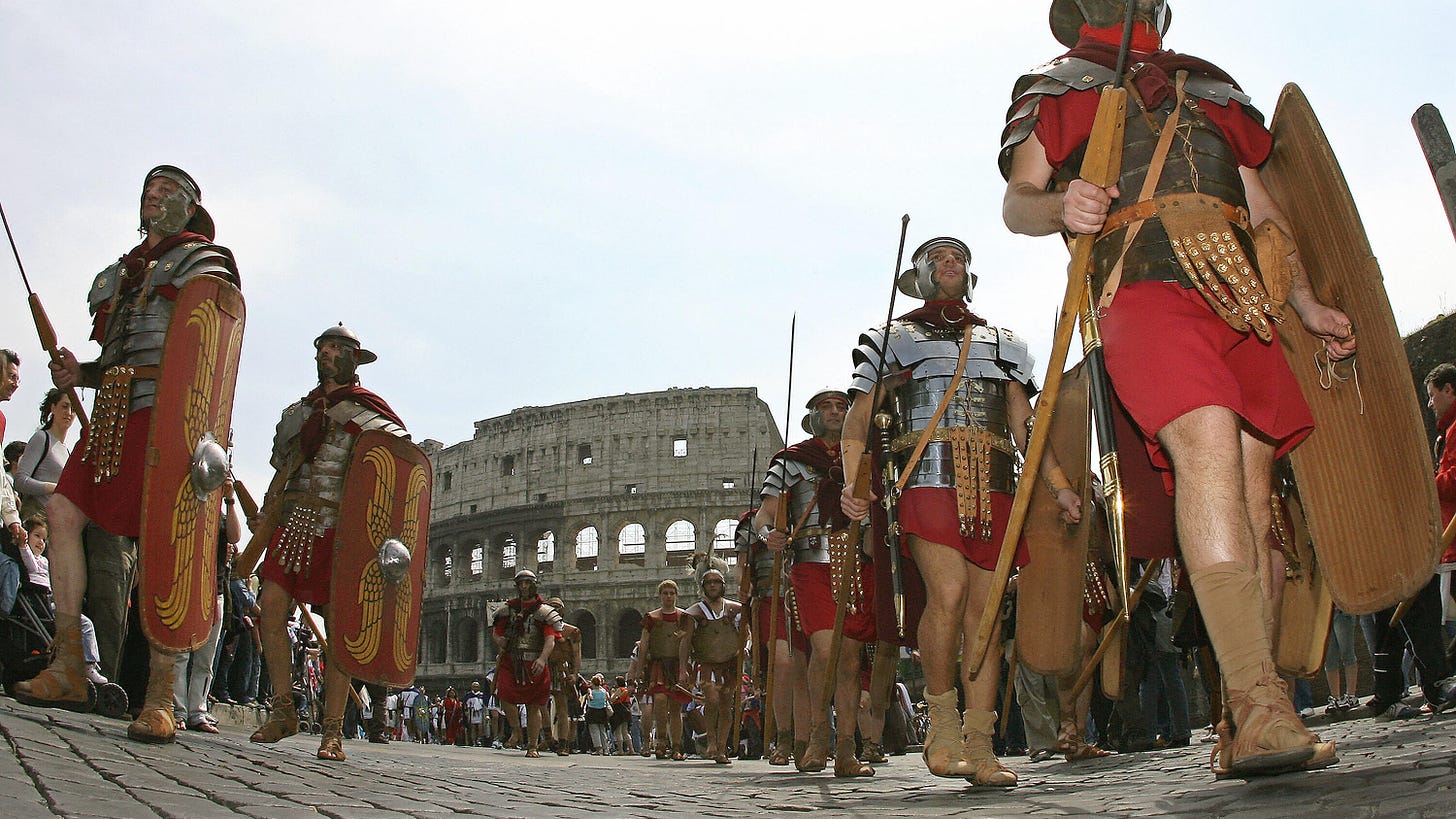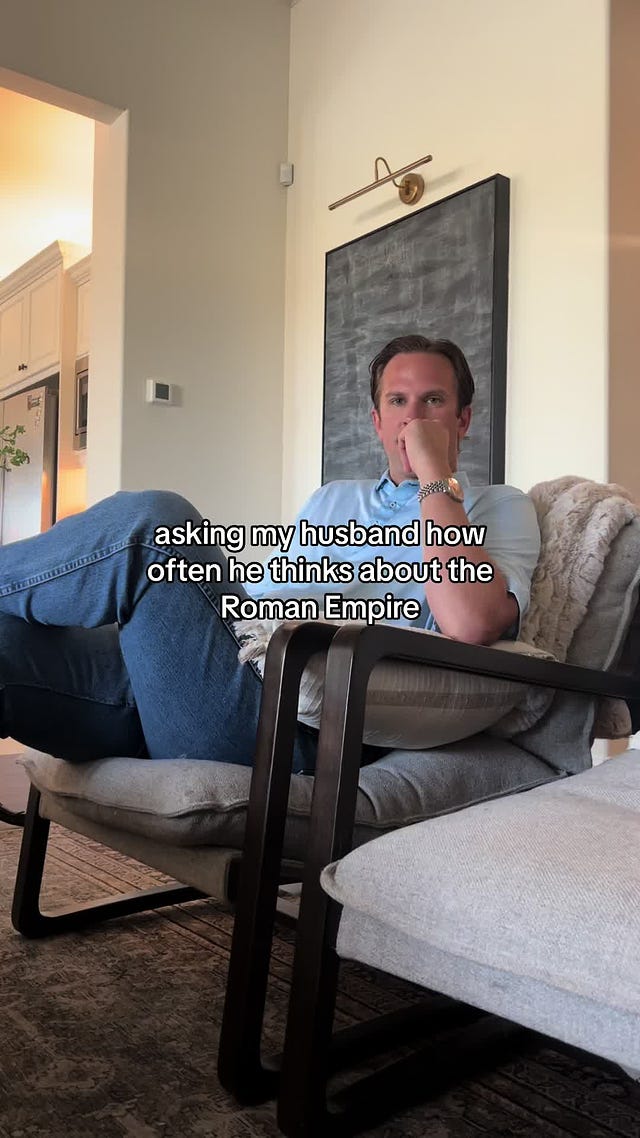That Roman Empire meme—and what it says about the war on imagination
At Dartington College and everywhere, the fight for imagination is thousands of years old
How often do *you* think about the Roman Empire?
On TikTok, women have been asking the men in their lives this question and sharing their shock when the men answer that it’s multiple times a week or even a day.
 Tiktok failed to load.
Tiktok failed to load.Enable 3rd party cookies or use another browser
At nearly 40, I have happily given up on trying to understand pop culture. I do not know how many Kardashians there are, though it seems like too many. So I’m not fully au fait with the cultural rendering of this Roman Empire question. I get the sense that there’s thought to be a whiff of the lumberjack shirt to admitting that you think about the Roman Empire multiple times a day. That it’s meant to signify a stodgy sort of pride in “civilisation”, or a very unsexy fixation on the functioning of sewers, or just your garden-variety Western male angst about power, the way it can slip through your fingers, so that one day you’re an emperor with a golden throne and a sexy leafy crown and the next you’re Russell Brand.
But look. I’m not Russell Brand. I do not own a lumberjack shirt. And I think about the Roman Empire all the bloody time. Here’s why:
Because the absolute failure of vision and imagination that I wrote about in last week’s piece…
The failure of vision and imagination that are playing out at Dartington College and also around the world, everywhere we see the neoliberal agenda crushing imagination and regeneration in the name of a pragmatism that is in fact just barely repressed terror and rage…
The life-denying, extractive culture, lived under a patriarchal punisher god, that have for so long defined the Western world…
The severance from the truth of what it is to live in a body…
The collective severance from the imaginal otherworld—that realm of deeper, truer meaning from which human culture emerged, and which every genius in human history has been connected to…
… all these roads lead to Rome.
Now, that’s an oversimplification. Of course it is. To a certain extent, the problems the world faces today were always latent in the human condition. As soon as you have the duality of self and other, plus a body that can feel hunger and fear, a brain capable of advanced cognition, and a world of finite resources… you have a pretty good recipe for disaster. By no means an inevitable recipe. There were many other ways this could all have played out. But the seed of this god-awful story we’re living was always there. (I am truly sorry for all these mixed metaphors, by the way. Just not sorry enough to fix them.)
But if the raw ingredients for a life-denying, imagination-starved civilisation were always there, the Roman Empire played a critical part in combining them in the particular way we see today. When I look at my own country, England, I see a nation divorced from any sense whatsoever of indigeneity—meaning not some murderous and false idea of racial purity but rather a sense of deep belonging to, and meaningful relationship with, place. As far as I can see, English culture in particular has almost entirely lost this sense of unconditional belonging and relatedness. What’s my evidence for that? Well:
The deadeningly complex but deathly serious system of class and etiquette for which we’re so famous. A system that is designed to remind people at all times that in order to merit a place here, to belong, they have to obey an archaic and arbitrary set of social rules.
Our history of having colonized a quarter of the world out of greed and rage and terror.
The continued force of this terrified, terrorizing colonizer mentality. Because the empire isn’t dead. It lives on, in the UK’s status as the world’s highest net exporter of financial services, and in the national propensity to worship at the chauvinist, jingoist altar of the Daily Mail, among other things.
When I look at all this, I see a nation that has forgotten what it would even mean simply to belong to life and to place, and to accept death and loss and insecurity as part of that belonging.
And when did that severance from life and place really take hold?
If you ask me, it was with the Roman Empire.
I’m not suggesting that everything was rosy before Caesar rolled across the seas. The archaeological record shows irrefutably that long stretches of the Neolithic were incredibly violent. And there seems to be have been a 90% shift in the genetic makeup of these islands after the Beaker People arrived around 4,500 years ago, a few thousand years before Caesar darkened the doorstep. The idea of some “pure”, peacefully nature-worshipping indigenous population is nonsense.
But something did shift once the Romans came. What?
Once the empire settled, power became a bureaucratic system, operated in obedience to imposed structures that originated elsewhere. (An exact mirror of the situation we’ve seen at Dartington and Schumacher Colleges these past weeks.) I deeply believe that this was the nail in the coffin—at least among the ruling classes—of any sense of an order of being that arose out of the land and the elements themselves.
And the Roman Empire was also when a new story of these islands began to be told—a highly toxic story that persists to this day. Because when the fighters and writers of Ancient Rome reported that before their civilising arrival, this was a land of barbarians, crazed Druids and their followers, drinkers of blood and tattooed warlords—that became the seed of this nation’s history. It’s the version of British history I was taught at school in the 1980s and 1990s, two thousand years after it was first recorded. It’s the version that we drew from to justify our own murderous colonial agenda, as soon as we had the naval might. It’s a chauvinist, life-denying story that sows self-hatred and an underlying suspicion of rituals and practices that emerge from or honour land and place.
And it completely obliterates the idea—the truth—that meaning and the most expansive, life-affirming stories and histories do not originate from Rome or Westminster or the Square Mile or any other earthly power centre. They originate from the imaginal otherworld, a place that can only be accessed through connection to land and a deep sense of belonging to life and to your own body.
In my country, it’s at least two thousand years since we collectively remembered the otherworld and our belonging, to this realm and, by natural extension, the one beyond. But that doesn’t mean we can’t find our way back there. The otherworld, the imaginal, has always been waiting to welcome us back, whenever we’re ready. I know because it welcomed me back, and that welcoming saved my life.
And that is why I think about the Roman Empire every day.
Love,
xx Ellie



